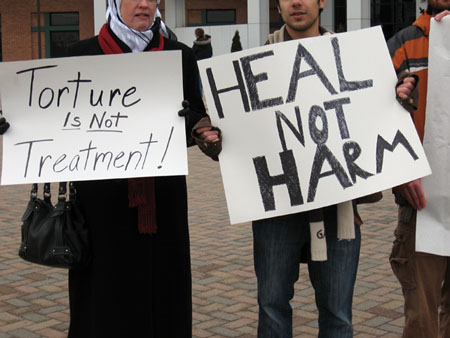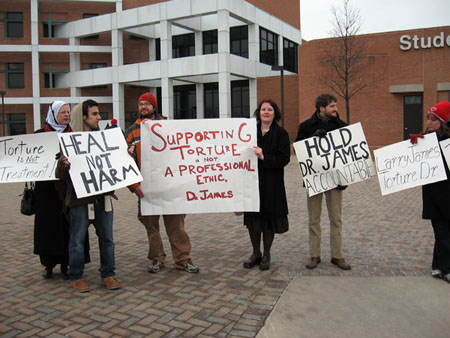I recently joined a group of activists who traveled across the state to protest Dr. Larry James' “Psychology of Terrorism Executive Workshop” at Wright State University in Dayton, Ohio. Col. Larry James was Chief Psychologist of the Joint Intelligence Group and a senior member of the Behavioral Science Consultation Team (BSCT), from 2003 to 2007. For most of the critical torture years of 2003 and 2004, James reported to Major General Geoffrey Miller. Miller was transferred from Guantanamo to Iraq to take over administration of the Abu Ghraib prison in Baghdad, from which stories and pictures of U.S. torture emerged in 2004. Send Comments
Subsequent to his complicity in prisoner abuse, James wrote a book Fixing Hell: An Army Psychologist Confronts Abu Ghraib. In his book, James describes witnessing inappropriate behavior during an interrogation, but instead of interfering or reporting the abuse, he lets it play out: “I heard lots of yelling, screaming, and furniture being thrown around. I saw Luther and three MPs wrestling with a detainee on the floor. It was an awful sight. I wanted to run back to my room and wash my eyes out with bleach. The detainee was naked except for the pink panties I had seen hanging on the door earlier. He also had lipstick and a wig on. The four men were holding the prisoner down and trying to outfit him with the matching pink nightgown, but he was fighting hard. My first instinct was to rush in and start barking orders at the men, demanding they stop this ridiculous and abusive wrestling match. But I managed to quell that urge and wait. I opened my thermos, poured a cup of coffee, and watched the episode play out, hoping it would take a better turn and not wanting to interfere without good reason, even if this was a terrible scene. I waited several minutes, but with no good end in sight I had to act.”

Among many startling admissions, James states that “It was clear to me that I was no longer a doctor but rather a combatant with the sole purpose of helping the Army kill or capture the enemy.” Dr. Trudy Bond lodged a complaint against him with the Louisiana State Board of Examiners of Psychologists (LSBEP) which was dismissed. Upon retiring from the Army, James was not licensed as a Psychologist in Ohio, but was granted a license. Concerned citizens plan to lodge additional complaints in Ohio in order to challenge his license.
At Wright State, we held signs saying “Larry James, Torture Doctor” , “Hold Larry James Accountable” “Heal not Harm” and “Torture is not Treatment”. Although our number was small, we did attract the campus police. In what was likely to have been a classic good cop/bad cop routine, a young campus policeman approached our group and asked us to disperse. We were told that campus police had received complaints. (I hope so!) We informed him that we had a right to stay as long as we were non threatening and not blocking access. He then informed us that we were breaking no laws, but once he ordered us to disperse and we refused, then we would be breaking the law and could be arrested. Soon, the good cop, a sergeant, showed up to inform us that we were within our rights and allowed the protest to continue.
Our small group of protesters was approached by several students and University employees. Most were unaware that the Dean of the Department of Psychology was named Larry James, and those who did know his name were unaware of involvement in the day to day operations of interrogations at Guantanamo and Abu Ghraib. Two students were very much aware of this travesty and were very appreciative of our presence on campus, promising to join the effort to challenge his license as a Psychologist in the State of Ohio.
President Obama appears to have decided to sweep the clear violations of American and International law regarding torture under the rug. He has chosen to look forward, not backwards, thereby leaving the blueprint for torture on the table for future Presidents to deal with. Dr. James workshop further legitimizes the use of torture. The intended audiences for this Executive Workshop are law enforcement officials, members of the Department of Homeland Security, DOD, and the Border Patrol.

The stated goals of the workshop are:
Define Psychological Terrorism
Identify Types of Psychological Terrorism
Discuss the role of the media in counter terrorism efforts
Identify how demographics are used to recruit teenage terrorists
Understand the psychological make-up of the suicide bomber
Discuss strategies to prevent psychological terrorism
Those of us who continue to feel outrage that our government condones torture must take action against legitimizing it's use. To support our efforts against torture, join us at When Healers Harm or email the Columbus Free Press (truth@freepress.org).
Subsequent to his complicity in prisoner abuse, James wrote a book Fixing Hell: An Army Psychologist Confronts Abu Ghraib. In his book, James describes witnessing inappropriate behavior during an interrogation, but instead of interfering or reporting the abuse, he lets it play out: “I heard lots of yelling, screaming, and furniture being thrown around. I saw Luther and three MPs wrestling with a detainee on the floor. It was an awful sight. I wanted to run back to my room and wash my eyes out with bleach. The detainee was naked except for the pink panties I had seen hanging on the door earlier. He also had lipstick and a wig on. The four men were holding the prisoner down and trying to outfit him with the matching pink nightgown, but he was fighting hard. My first instinct was to rush in and start barking orders at the men, demanding they stop this ridiculous and abusive wrestling match. But I managed to quell that urge and wait. I opened my thermos, poured a cup of coffee, and watched the episode play out, hoping it would take a better turn and not wanting to interfere without good reason, even if this was a terrible scene. I waited several minutes, but with no good end in sight I had to act.”

Among many startling admissions, James states that “It was clear to me that I was no longer a doctor but rather a combatant with the sole purpose of helping the Army kill or capture the enemy.” Dr. Trudy Bond lodged a complaint against him with the Louisiana State Board of Examiners of Psychologists (LSBEP) which was dismissed. Upon retiring from the Army, James was not licensed as a Psychologist in Ohio, but was granted a license. Concerned citizens plan to lodge additional complaints in Ohio in order to challenge his license.
At Wright State, we held signs saying “Larry James, Torture Doctor” , “Hold Larry James Accountable” “Heal not Harm” and “Torture is not Treatment”. Although our number was small, we did attract the campus police. In what was likely to have been a classic good cop/bad cop routine, a young campus policeman approached our group and asked us to disperse. We were told that campus police had received complaints. (I hope so!) We informed him that we had a right to stay as long as we were non threatening and not blocking access. He then informed us that we were breaking no laws, but once he ordered us to disperse and we refused, then we would be breaking the law and could be arrested. Soon, the good cop, a sergeant, showed up to inform us that we were within our rights and allowed the protest to continue.
Our small group of protesters was approached by several students and University employees. Most were unaware that the Dean of the Department of Psychology was named Larry James, and those who did know his name were unaware of involvement in the day to day operations of interrogations at Guantanamo and Abu Ghraib. Two students were very much aware of this travesty and were very appreciative of our presence on campus, promising to join the effort to challenge his license as a Psychologist in the State of Ohio.
President Obama appears to have decided to sweep the clear violations of American and International law regarding torture under the rug. He has chosen to look forward, not backwards, thereby leaving the blueprint for torture on the table for future Presidents to deal with. Dr. James workshop further legitimizes the use of torture. The intended audiences for this Executive Workshop are law enforcement officials, members of the Department of Homeland Security, DOD, and the Border Patrol.

The stated goals of the workshop are:
Define Psychological Terrorism
Identify Types of Psychological Terrorism
Discuss the role of the media in counter terrorism efforts
Identify how demographics are used to recruit teenage terrorists
Understand the psychological make-up of the suicide bomber
Discuss strategies to prevent psychological terrorism
Those of us who continue to feel outrage that our government condones torture must take action against legitimizing it's use. To support our efforts against torture, join us at When Healers Harm or email the Columbus Free Press (truth@freepress.org).
